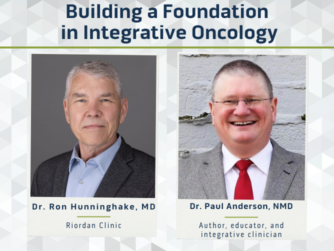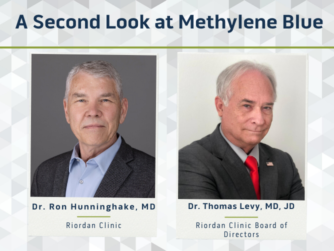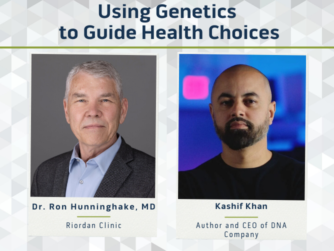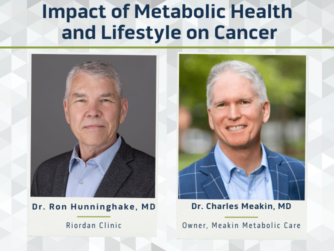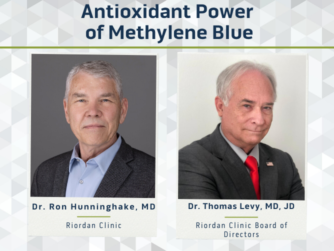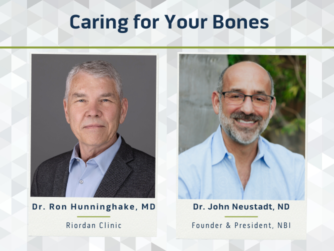In this episode of the Real Health Podcast, Dr. Ron Hunninghake, MD, Chief Medical Officer, reflects on his 35 years at the Riordan Clinic, how he transitioned to holistic medicine, his role as a co-learner, and shares some insight into what is next for him. Join us in celebrating Dr. Ron’s 35 years at the clinic and listen to his thoughts about what those years have meant to him.
Listen to the Episode
Watch the Video
Thank You to this Episode’s Sponsor
Links
Riordan Clinic: https://riordanclinic.org/
Read the Transcript
Disclaimer: The information contained on the Real Health podcast and the resources mentioned are for educational purposes only. They’re not intended as and shall not be understood or construed as medical or health advice. The information contained on this podcast is not a substitute for medical or health advice from a professional who is aware of the facts and circumstances of your individual situation. Information provided by hosts and guests on the Real Health podcast or the use of any products or services mentioned does not create a practitioner-patient relationship between you and any persons affiliated with this podcast.
Intro: This is the Real Health podcast brought to you by Riordan Clinic. Our mission is to bring you the latest information and top experts in functional and integrative medicine to help you make informed decisions on your path to real health.
Dr. Ron Hunninghake: Well, hello, everyone. This is Dr. Ron Hunninghake, and this, starting tomorrow, will be my 35th year at the Riordan Clinic. And I’ve been asked to reflect on what this means for me. And of course, I’m profoundly grateful, first of all, that I’ve had the opportunity to get to learn so much as a co-learner. And being a co-learner took a tremendous amount of weight off my shoulders because I know most doctors feel like they walk into the room and it’s their job to fix people. And my job here is to co-learn or to work with people to help them figure out what it is that’s keeping them from getting well.
And so it’s detective work, but it’s the two of us working together as opposed to me having the unrealistic expectation of solving their medical problems. Because what we’ve found over the years is that everyone has a story. Most diseases actually involve a story in their life as to what has happened, what has burdened them, what excesses or deficiencies they’ve encountered in their life, and that this has built up and built up into the point to where it shows up as a physical or a mental or even a spiritual illness.
And as someone who’s trained in holistic medicine, I don’t mind looking at the spiritual dimension in the sense of the holistic dimension of that person, because what I’ve found is that most of the illnesses that people come with are fairly complicated involving other people, involving jobs, children, financial. So it’s not just a straightforward, “I’ve got headaches.” It’s like, “Okay, what are some of these root causes?”
Now, the other part of this is that there is definitely a biochemical underpinning to it. And as a chemistry major in college, I like getting into the biochemical aspects of this because it’s something that we can put numbers to, we can see where the deficiencies are and we can help people begin to make, not just changes in supplements, but also in lifestyle habits, sleep habits, relaxation habits, because it’s the habits in our lives that can get us into trouble. But they’re the things that can save us, because if we can learn how to derive better habits, we can actually enhance our health and wellbeing and reduce our risk of illness in the future, and more effectively deal with the day-to-day problems and symptoms and illnesses that otherwise drag us down.
So for me to be here and to learn all that on a stage of day-to-day practice, as this is the practice of functional medicine, I’m once again very grateful and very happy that I have gotten this opportunity because I actually look forward to going to work as opposed to a lot of people either are fairly neutral or dread work, I actually look forward to the challenges of the day and am very happy when people walk out feeling better than when they came in. And that’s always my goal, is to help people feel better and do better for themselves.
So Dr. Hugh Riordan, who was the founder of the Riordan Clinic, which at that time was the Center for the Improvement of Human Functioning, was an incredible guy. He could be a tough guy, but I’ve always had tough mentors in my life, and I’m very thankful that I have, because I knew his intention was always good. It’s one thing for someone to be tough, but he was never really mean. He just had such high standards of not only what he did, but he wanted me to reflect the high standards of the Riordan Clinic, because he knew that because we were outside the norm of medical care, we had to do something above and beyond the standard of care.
We had to excel in ways that a lot of doctors just didn’t have the time or the inclination to work on. And so he was a great mentor and he was quite a character. I do have to mention that without Mrs. Olive Garvey, who was really the other founding individual, Mrs. Garvey probably had the vision, and Dr. Riordan had the know-how to take that vision and put it into everyday existence in terms of raising the money, seeing the patients, administering the whole staff of the Riordan Clinic, and actually going out and explaining to the public what we were all about, which was a full job in and of itself, because functional medicine is a lot different than conventional medicine, even though patients make appointments and come in and see the doctor and go through their complaints and concerns and testing is done.
But there’s a dimension of holistic care that some doctors are able to achieve in their practices, but most of them are in such a hurry to get through the day, you don’t have time enough to really listen deeply and find what the underpinnings, the root causes are of these chronic illnesses that we present with. So I would say overall, Dr. Riordan was a tremendous teacher, friend, guide and an inspiration for me to try to be better than what I was, and I’m very thankful for him.
So family medicine is probably the most holistic of the various specialties. I mean, it’s a specialty in generality. And the reason I went into it is because I went to medical school with a profound interest in wellness. I had in college had gotten interested in the concept of people working to help themselves be healthier and to achieve a higher level of wellness. And I kept looking for that in medical school. And medical school is about illness and more specifically about disease, making a diagnosis of disease. The diagnostic process itself can be quite challenging. And then developing a treatment plan and getting people started on primarily pharmaceutical interventions or surgical or some other procedural intervention.
And that was all very challenging. And I think for me, it was a very important foundation. Without my background in general practice, I wouldn’t have had the stability to understand how to deal with patients because we are responsible here at Riordan Clinic for identifying like appendicitis. Okay, appendicitis, you need more than just a vitamin C infusion if you’ve got acute appendicitis; that could take someone’s life if it was ignored. So we try to provide a kind of safe landing for traditional medical care in our practice, and we refer immediately if a patient has a more serious acute illness.
But what we focus on is complex chronic illness. And there is that dimension in the family practice training and care that I provided. I was actually the medical director of a nursing home for five years. But one of the trends that I saw is that patients in the nursing home, and some of my patients too, were being seen by multiple specialists, and each specialist was putting them on a different medicine and weren’t always talking with one another. And one medicine was causing side effects for another medicine, which was causing side effects for another medicine. And pretty soon these individuals would be on 10 to 12 medications, polypharmacy. And I felt like if they would have a really good nutritional evaluation with laboratory testing, we could identify what some of the root causes were, and actually help them get off of the extra medication and get more onto lifestyle changes that would be better for their overall health and wellbeing.
And so this was not really possible in my family practice program, even though we did have a good wellness program and it gave me a good lifestyle foundation, exercise and diet and taking care of your psychology. But it really needed the stage of the Riordan Clinic to bring that into full fruition. So that’s why, when I ran into Dr. Riordan accidentally and I was introduced, he invited me down for lunch. And it wasn’t too long after that I was coming on a regular basis, and it wasn’t too long after that I joined the Riordan Clinic. And so I’ve been here for 35 years and still learning.
Advertisement: There’s a lot more to this conversation. And it’s coming up right after a quick break. Today’s podcast is brought to you by LivOn Labs, makers of liposomal vitamins and supplements. LivOn uses a liposomal encapsulation technology to protect nutrients from destruction in the digestive system. This allows for more efficient delivery of essential vitamins and nutrients. Choose from various supplements that support health and wellbeing, such as Lypo-Spheric vitamin C, magnesium, glutathione, and more. To learn more, visit LivOn Labs, that’s L-I-V-O-N labs.com.
Dr. Ron Hunninghake: So how does being a doctor co-learner impact my care of patient co-learners? So it becomes a common ground, and so I don’t have to put on any kind of airs, like somehow I know everything and I’m going to give you the magic bullet that’s going to make you well. I can kind of enter into the internal dialogue that the patient has been having about their chronic illness, because most patients come to us quite frustrated. They’ve been to many different doctors, they’ve gotten many different diagnoses, and yet they haven’t been able to get to the fundamental causation factors. And oftentimes it’s more than one factor.
So of course, we test for nutritional and biochemical imbalances. We look for hormonal issues, lifestyle issues. Here lately I’ve been doing more with hidden traumatic issues in a person’s life that is sustaining their illness. But more often than not, it’s just forming a partnership with people to where the trust level goes up and they are able to reveal more about their illness than maybe they felt inclined to do with other practitioners. And so that level of deeper sharing helps us to identify these causative factors and to start to make changes, so that they are able to take better control of their lives and make better choices, and read more books and learn how to become a more effective co-learner themselves.
So in many ways, I’m trying to model for them what it is I think they should be doing. And that was something else that Dr. Riordan had taught was that don’t prescribe anything that I myself have not done and experienced and found to be helpful and effective. So a lot of what I’m recommending to patients are things that I’ve found worked for me, and I tell them that, it’s not like some hidden thing. And so a lot of the supplements… Some people say I’m the best customer at our supplement store because I do try, and I don’t always stay with them, but I do try most of the supplements that we have in some context or another, based upon lab work or something that I’ve read.
So I’m always open to trying new things. And that’s another really good aspect of working at the Riordan Clinic. Every day’s a new day, there’s a fresh approach to everything. And so what I thought I knew, I’m able to find out there are things that I didn’t know at all, and I have to relearn them in a new way as new information comes about. So in the 35 years I’ve been here, things haven’t really changed that much. There’s been a lot of personnel change. There have been people that have left or have died.
Dr. Riordan himself died in 2005, suddenly, and we were there and we almost resuscitated him, but he wanted a drink of water. And so when we stopped the CPR and gave him the drink of water, his eyes rolled back and he was gone. And so that was a huge shock because now it was up to us to carry the load, to carry the goal, all that he had hoped for this to be, it was our job now to carry that on. So that was a pretty big responsibility. And again, there were good times and bad times. But I would say what has made it better is that the basic theme of the Riordan Clinic, the Center for the Improvement of Human Functioning, has attracted people who really want this innovative endeavor to succeed.
If we hadn’t attracted the good people that we have, not only now, but through the years, there’s no way this kind of unique business, it’s really a nonprofit business, but it’s still a business and it does require administration, it does require all kinds of different types of people supporting the medical aspect of it. And so I’ve been grateful for the people who have not only joined us as a job, but they too have answered the calling and have seen that there’s something more that we’re doing here that goes beyond just being a job. And so it’s really all of us here working as a team that really makes this place shine. And so that aspect for me has been the stabilizing component of why I’m able to continue, because I’ve never felt like I’ve had to do it alone.
So really, if you want to get down to the nitty gritty of what this job has meant to me, I guess my greatest fear would be having lived a life that didn’t really make a difference to anyone, including myself. And I feel like every day that I come to work here, I gain new meaning and new purpose and new friends and new co-learners. And I’m constantly not only being inspired by their own struggle, their own effort to overcome their what sometimes seem to be hopeless illnesses like cancer and autoimmune disease, and some of these chronic illnesses that people oftentimes just linger on and on and…
We see miracles with people. They’re not based upon shamanistic things, they’re based upon hard work. They’re based upon the fact that people are willing to dig into their lives and make the changes that will help them change their biochemistry, change their metabolism, change their diets, improve their sleeping habits, get exercise, look deeply into their own souls about what’s really important to them and what they need to do in their life to make a difference for themselves and for others. And so it’s that aspect of not only being there for them, but also helping inspire in them a feeling that they too can heal and make a difference in their lives.
People have asked me, when are you going to retire? And my stock answer is, “As soon as I stop learning.” So I don’t know when that’s going to be because it seems to be pretty much ingrained in my day-to-day reading and work with patients and looking up new things, trying new things. So there’ll be some time, but it’s probably not in the near future, and it’s going to be probably more greater flexibility as time goes on so I can do other things for the Riordan Clinic.
I’d like to spend a little bit more time getting this message out to people because I think there’s a lot of people out there that are hungry to find a place like this, but they just don’t know we’re here. They know we’ve got these domes and the pyramid and they say, “Gee, that’s kind of weird.” But they don’t know what goes on inside. It’s what goes on inside that matters in the final analysis.
Outro: Thank you for listening to the Real Health podcast. If you enjoyed this episode, be sure to subscribe and leave us a review. You can also find all of the episodes and show notes over at realhealthpodcast.org. Also, be sure to visit riordanclinic.org where you will find hundreds of videos and articles to help you create your own version of real health.


